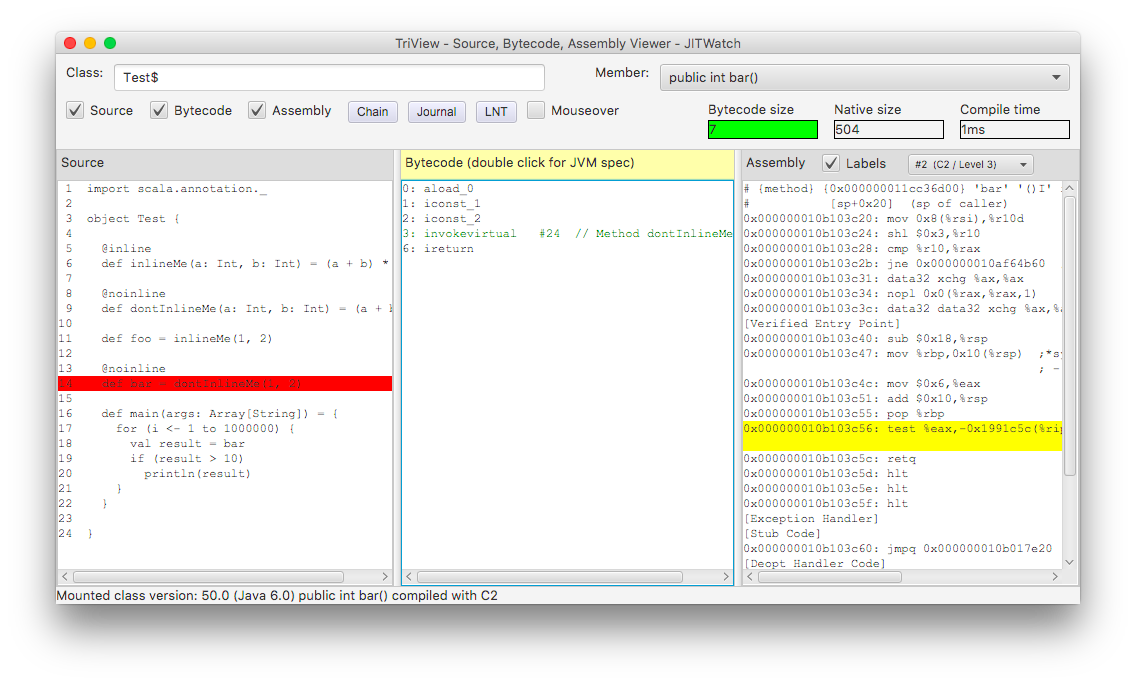@inline and @specialized
What Do They Do?
Should I Be Using Them?
Chris Birchall
Scala Days New York 2016
Agenda
-
Inlining
- In general
- On the JVM
- In Scala
- Benchmarks
-
Speciali{s|z}ation
- JVM types and generics in Java and Scala
- Specialisation in Scala
- Benchmarks
WARNING
Bytecode
ahead!
me me me

-
Chris Birchall
-
@cbirchall
-
github.com/cb372

Why should I care?
Performance matters!
(sometimes)
Inlining
Inlining
Remove a function call
by copying the function body into the caller
def target(a: Int, b: Int) = {
(a + b) * 2
}
def caller = {
val x = 1
val y = 2
target(x, y)
}def caller = {
val x = 1
val y = 2
(x + y) * 2
}inlining
Inlining
- Not specific to Scala or JVM
- Removes overhead of function call
- Enables further optimisations
Removes function call overhead
def target(a: Int, b: Int) = {
(a + b) * 2
}
def caller = {
val x = 1
val y = 2
target(x, y)
}def caller = {
val x = 1
val y = 2
(x + y) * 2
}inlining
// def target
0: iload_1
1: iload_2
2: iadd
3: iconst_2
4: imul
5: ireturn
// def caller
0: aload_0
1: iconst_1
2: iconst_2
3: invokevirtual #24
6: ireturn0: iconst_1
1: iconst_2
2: iadd
3: iconst_2
4: imul
5: ireturnIf the resolved method is not signature polymorphic (§2.9), then the invokevirtual instruction proceeds as follows.
Let C be the class of objectref. The actual method to be invoked is selected by the following lookup procedure:
-
If C contains a declaration for an instance method m that overrides (§5.4.5) the resolved method, then m is the method to be invoked, and the lookup procedure terminates.
-
Otherwise, if C has a superclass, this same lookup procedure is performed recursively using the direct superclass of C; the method to be invoked is the result of the recursive invocation of this lookup procedure.
-
Otherwise, an AbstractMethodError is raised.
The objectref must be followed on the operand stack by nargs argument values, where the number, type, and order of the values must be consistent with the descriptor of the selected instance method.
If the method is synchronized, the monitor associated with objectref is entered or reentered as if by execution of a monitorenter instruction (§monitorenter) in the current thread.
If the method is not native, the nargs argument values and objectref are popped from the operand stack. A new frame is created on the Java Virtual Machine stack for the method being invoked. The objectref and the argument values are consecutively made the values of local variables of the new frame, with objectref in local variable 0, arg1 in local variable 1 (or, if arg1 is of type long or double, in local variables 1 and 2), and so on. Any argument value that is of a floating-point type undergoes value set conversion (§2.8.3) prior to being stored in a local variable. The new frame is then made current, and the Java Virtual Machine pc is set to the opcode of the first instruction of the method to be invoked. Execution continues with the first instruction of the method.
invokevirtual
Enables further optimisations
class A(x: Int) {
def plusOne() = x + 1
}
def two: Int = {
val a = new A(1)
a.plusOne()
}def two: Int = {
val a = new A(1)
a.x + 1
}def two: Int = {
1 + 1
}
escape
analysis
inlining
Conclusion:
Inlining is a Good Thing.
So...
Why not inline everything?
Answer: Code is data
- Inlining duplicates code -> code gets bigger
- If it gets too big, doesn't fit in CPU caches
So we should only inline HOT functions
The JVM
(specifically HotSpot)
is pretty good at this
Inlining in HotSpot
Conditions for inlining
-
Small
-
-XX:InlineSmallCode (default 1000 bytes of assembly)
-
-XX:MaxInlineSize (default 35 bytes of bytecode)
-
-XX:MaxTrivialSize (default 6 bytes of bytecode)
-
-
Hot
-
-XX:MinInliningThreshold (default 250?)
-
-
Caller not already too big (default 325 bytes of bytecode)
-
Not a native method
-
...
JITWatch

Inlining in Scala
import scala.annotation._
object Test {
@inline
def inlineMe(a: Int, b: Int) = (a + b) * 2
@noinline
def dontInlineMe(a: Int, b: Int) = (a + b) * 2
def foo = inlineMe(1, 2)
def bar = dontInlineMe(1, 2)
}$ scalac -optimise -Yinline-warnings Test.scalaInlining heuristics
(Scala 2.10.0 - 2.11.x)
- Only inline "effectively final" methods
- For external libs:
- In general, only @inline-annotated methods
- Special treatment for scala.runtime.*, scala.Predef
- Special treatment for 'monadic' methods, higher-order funcs
-
Score-based heuristics
- it’s bad to make the caller larger if it was small
- it’s bad to inline large methods
- it’s good to inline higher order functions
- it’s good to inline closures
New optimiser in 2.12
only inline @inline-marked methods,
and always inline them,
including under separate-compilation
-
Also inline higher-order functions
-
No more score-based heuristics
-
Better synergy with HotSpot
Let's benchmark!
WARNING
Like most benchmarks,
this one is probably wrong
Fast Fourier Transform

Cooley-Turkey algorithm
- Recursive
- Lots of numerical ops on complex numbers
final case class Complex(r: Double, i: Double) {
@inline def +(x: Complex) = Complex(r + x.r, i + x.i)
@inline def -(x: Complex) = Complex(r - x.r, i - x.i)
@inline def *(x: Complex) = Complex(r * x.r - i * x.i, ...)
}Benchmark results
| HotSpot inlining disabled | HotSpot inlining enabled | |
|---|---|---|
| @inline | 1208 ± 11 | 360 ± 10 |
| @noinline | 1226 ± 14 | 355 ± 4 |
Scala 2.11.8, GenASM
| HotSpot inlining disabled | HotSpot inlining enabled | |
|---|---|---|
| @inline | 1237 ± 12 | 330 ± 4 |
| @noinline | 1243 ± 13 | 329 ± 4 |
Scala 2.12.0-M4
- Units = ms/op, smaller is better
- FFT of 64k random doubles
JMH settings: 20 warmup, 20 iterations, 10 forks
Further reading
-
Oracle slides about HotSpot optimisations, including inlining
-
Blogposts about Java performance tuning
-
Explanation of initial prototype of the new optimizer in Scala 2.12
- Explanation of Fourier transform
Specialisation
Types in the JVM
-
Primitive types
- boolean, byte, char, short, int, long, float, double
- Memory-efficient (no object header overhead)
- Passed by value
-
Reference types
- Anything that extends from java.lang.Object
- Passed by reference
- (pedantry: actually a reference is passed by value)
Generic methods in Java
public class Generic {
<A> void foo(A a) {
return;
}
void test() {
foo("hello");
foo(123);
}
}Generic methods in Java
<A> void foo(A);
descriptor: (Ljava/lang/Object;)V
Code:
0: return
void test();
descriptor: ()V
Code:
0: aload_0
1: ldc #2 // String hello
3: invokevirtual #3 // Method foo:(Ljava/lang/Object;)V
6: aload_0
7: bipush 123
// Method java/lang/Integer.valueOf:(I)Ljava/lang/Integer;
9: invokestatic #4
12: invokevirtual #3 // Method foo:(Ljava/lang/Object;)V
15: return
Scala types
Any
AnyVal
Int
Double
...
AnyRef
j.l.Object
}
JVM primitives
Generic methods in Scala
import scala.collection.mutable
object StdlibMapExample {
def foo(): Unit = {
val map = mutable.Map.empty[String, Int]
map.put("key", 123)
}
}Generic methods in Scala
public void foo();
Code:
0: getstatic #18 // Field scala/collection/mutable/Map$.MODULE$:Lscala/collection/mutable/Map$;
3: invokevirtual #22 // Method scala/collection/mutable/Map$.empty:()Lscala/collection/mutable/Map;
6: astore_1
7: aload_1
8: ldc #24 // String key
10: bipush 123
// Method scala/runtime/BoxesRunTime.boxToInteger:(I)Ljava/lang/Integer;
12: invokestatic #30
15: invokeinterface #36, 3 // InterfaceMethod scala/collection/mutable/Map.put:(Ljava/lang/Object;Ljava/lang/Object;)Lscala/Option;
20: pop
21: return

Specialisation
Generate multiple versions of a class
to remove boxing overhead
Specialisation
MySpecialMap$mcB$sp.class // byte
MySpecialMap$mcC$sp.class // char
MySpecialMap$mcD$sp.class // double
MySpecialMap$mcF$sp.class // float
MySpecialMap$mcI$sp.class // int
MySpecialMap$mcJ$sp.class // long
MySpecialMap$mcS$sp.class // short
MySpecialMap$mcV$sp.class // null
MySpecialMap$mcZ$sp.class // boolean
MySpecialMap.class // AnyRefclass MySpecialMap[@specialized A] {
def put(key: String, value: A): Unit = ...
def get(key: String): Option[A] = ...
}
Specialisation
class MySpecialMap[@specialized A] {
def put(key: String, value: A): Unit = {}
def get(key: String): Option[A] = None
}
object Test {
def foo(): Unit = {
val map1 = new MySpecialMap[Int]
map1.put("key", 123)
}
}Specialisation
0: new #15 // class MySpecialMap$mcI$sp
3: dup
4: invokespecial #16 // Method MySpecialMap$mcI$sp."<init>":()V
7: astore_1
8: aload_1
9: ldc #18 // String key
11: bipush 123
// Method MySpecialMap.put$mcI$sp:(Ljava/lang/String;I)V
13: invokevirtual #24
16: return
How does the caller know?
Constant pool:
...
#7 = Utf8 Lscala/reflect/ScalaSignature;
#8 = Utf8 bytes
#9 = Utf8 ??e2A!??? \taQ*_*qK?L?\r\'ba*\t1!A?=K6?H/
??U?a?F\n?? ?\"?C???%Q?AC??g? G.Y???%?a!?8z%?4?\"???\t?y?A?
j]&$h?F??!\r\t?AE???A?1????\t%)??)A?? ?aCA?B#\t9\"???\t1%??$
??? >$?.?8h!\tA1$?? ?\t??I\=)?Qq?C?? ?\t??BA?ta? ?.?7ju?$?\"
???\t???a?9viR?Ae\n???!)?B??\n??)f.?;\t !\n??A???-,????+[9??
bK??Y%\ta??:fI?4?B??0???FO]5oO*?A&???c??\rAE??m?dW/???g?!\t?
N??O?$HCA?9!\rAaGE??o%?aa?9uS>t?\"??3??I?@specialized is a static annotation
→ stored in the class's ScalaSignature
^^^ somewhere in there! ^^^
Space tradeoff
-
Specialisation generates a lot of duplicated code
-
But you can specify the types you want to specialise
class MySpecialMap[@specialized (Int, Long, Double) A] {
...
}
Boxing in the Scala stdlib
(as of 2.11.8)
-
Tuple1: @specialized(Int, Long, Double)
-
Tuple2: @specialized(Int, Long, Double, Char, Boolean)
-
Tuple3+: BOXING!
-
Option: BOXING!
-
Function{0,1,2}: Various combinations of @specialized
-
Immutable collections: BOXING!
-
Mutable collections: BOXING!




Alternatives
Let's benchmark!
Bloom filter
class BloomFilter[@specialized(Int) A](m: Int, k: Int)
(implicit hashFunctions: HashFunctions[A]) {
def add(value: A): Unit = ...
def query(value: A): Boolean = ...
}
trait HashFunctions[@specialized(Int) A] {
def alpha(value: A): Int
def beta(value: A): Int
}
Benchmark results
- Insert 42
- Query for membership of 123
| Average time taken | |
|---|---|
| With specialisation | 0.163 ± 0.001 |
| Without specialisation | 0.165 ± 0.001 |
JMH settings: 20 warmup, 20 iterations, 10 forks
Units = μs/op, smaller is better
Further reading
Honourable mentions
Honourable mentions
- @strictfp
- Adds strictfp (strict floating point) flag to classfile
- @switch
- Ensures a pattern match generates performant bytecode (either tableswitch or lookupswitch)
-
@elidable
An annotation for methods whose bodies may be excluded from compiler-generated bytecode

Summary
@inline
@specialized
Thank you!

